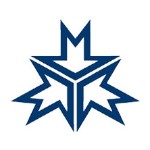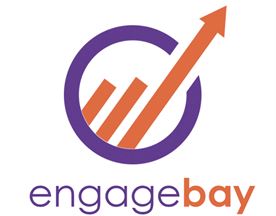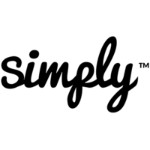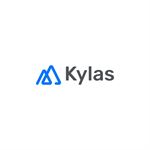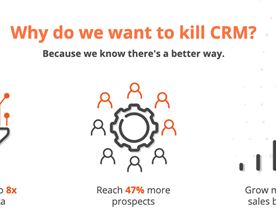CRM is an acronym for Customer Relationship Management. Recruiting CRMs are a type of software that works with recruiters to manage the recruiting process.
From finding new potential hires to going through the onboarding process, it offers convenience every step of the way. Recruitment CRM software helps to automate repetitive tasks in order to reduce manual labor.

The recruitment CRM generally streamlines the process of recruiting for hiring managers to speed up the hiring timeline.
For management, there are many benefits to using CRM. They can get key insights by analyzing the data from the recruitment CRM to help to make better-informed decisions about hires.
Managers can customize workflow and pipeline management to help meet your recruitment goals.

Characteristics of a Recruiting CRM
Applicant Tracking Systems (ATS)
A robust Applicant Tracking System (ATS) is the core feature of most CRMs for recruitment. For many looking for the best recruiting CRM software, this is a necessary element for high volume recruiting and collaborative hiring. It also helps with performance management.
The recruiting CRM is designed to simplify and automate the recruitment process by tracking, filtering, and sorting candidate information more efficiently.
The recruitment CRM streamlines posting of job postions by automatically populating information from previous applications and streamlining the application process for candidates.
Additionally, it reduces manual data entry through automated form completion and can generate reports on key metrics such as open jobs, jobseekers’ demographics, hire rates, and time-to-fill rate.
The recruitment CRM allows recruiters to quickly identify trends in the recruitment pipeline and make informed decisions when recruiting potential new hires when they post jobs.

Automated Email Tools
CRMs also offer automated email and communication tools to help recruiters stay organized while communicating with candidates throughout the recruitment process. They can schedule interviews when posting on multiple job boards and a career site to find the right talent pools. Communication tools like these can help manage potential candidates and candidate profiles.
For example, emails can be sent out automatically with a recruiting CRM when a resume is received or an interview is scheduled, eliminating manual tasks that may take up precious time during the recruitment process.
The automation of email communication in recruitment CRM helps ensure that all applicants receive timely responses which creates a positive experience for applicants and improves candidate management throughout the entire process.
Additionally, recruiters can track interactions with candidates in order to better determine their suitability for a position or assess any potential red flags before bringing them onto your recruiting teams.

Workflow and Pipeline Management
Customizable workflow and pipeline management is one of the main features of a CRM for recruitment.
Using a recruiting CRM allows recruiters to customize throughout your entire recruitment process, so they can adjust it according to your specific needs and preferences.
This recruitment CRM feature enables them to manage the recruitment strategies with ease, such as tracking postings, sorting and filtering incoming resumes, keeping tabs on candidate progress throughout each stage of the recruitment marketing process, and following up with candidates regularly to keep candidates engaged. It helps organize all aspects of talent management.
Recruiting CRM software provides visibility into the entire recruitment pipeline by allowing recruiters to see where every candidate is in the recruitment process at any given time. It’s a necessary part of the entire recruiting process for the recruitment team to manage candidates. It can also benefit job seekers to be spotted as the top talent by recruiting and staffing agencies to build better candidate relationships and find the best talent for new job openings.

Robust Data Analysis
Robust data analysis and reporting capabilities are also key benefits of using CRM for recruitment for hiring managers and recruitment agencies. This helps with talent pipelines and to have a more structured hiring process.
It allows recruiters to access detailed information about the candidates who have applied for a position, such as a resume keyword matches, job qualifications, desired skillset, and language proficiency tests results from the job board.
This insight helps recruiters make informed decisions through the entire hiring process when considering which applicants should progress further through the recruitment pipeline.
The recruiting CRM software provides insights into how many people applied for a position, how long it takes to fill an open job posting, and other metrics that help measure performance against set goals or objectives.
You can make data-driven decisions by tracking key performance indicators (KPI’s) like time-to-fill, time-to-hire, age of job, and offer acceptance rate.
A good recruitment CRM elevates that traditional CRM many times over by interacting with job boards, almost all relevant social media platforms, manages professional referral and candidate sourcing, some also have resume parsing tools to extract details and populate candidate, contact, and job records.
Furthermore, powerful reporting features allow recruiters to create customized reports based on various criteria such as location, department, or job type so they can gain deeper insights into how your recruitment teams are performing over time.
Best CRM for Recruitment
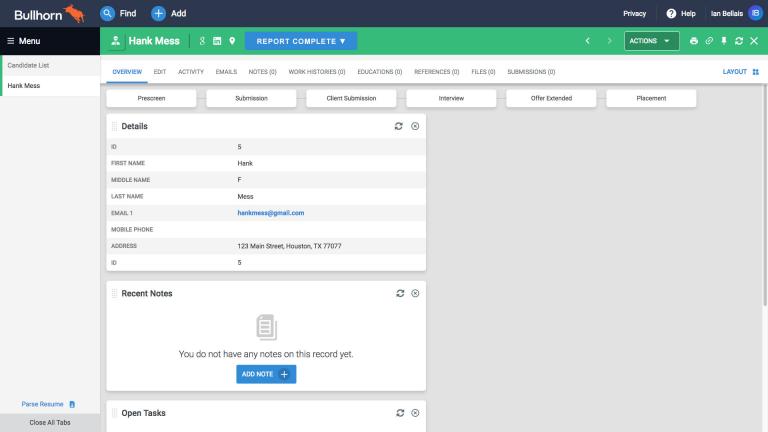
Bullhorn
Bullhorn is an Applicant Tracking System (ATS) and Customer Relationship Management (CRM) recruiting CRM specifically designed for the recruitment industry.
Bullhorn is more than just a recruiting CRM, it is a comprehensive platform that enables recruiters to manage every step of the recruitment process from job postings and job openings, sourcing, tracking candidate applications, and managing communication with applicants. This improves the candidate experience and attract candidates with the right qualities.
Bullhorn is a cloud based platform and offers a range of features such as automated email templates and workflow customization to help streamline and automate the recruitment processes.
Additionally, the recruitment CRM has built-in reporting and advanced analytics tools provide insights into key recruiting metrics and candidate data per user such as time-to-fill rate, applicant conversion rate, hire rate, cost per hire, etc., allowing recruiters to track performance against your set objectives for human capital management.
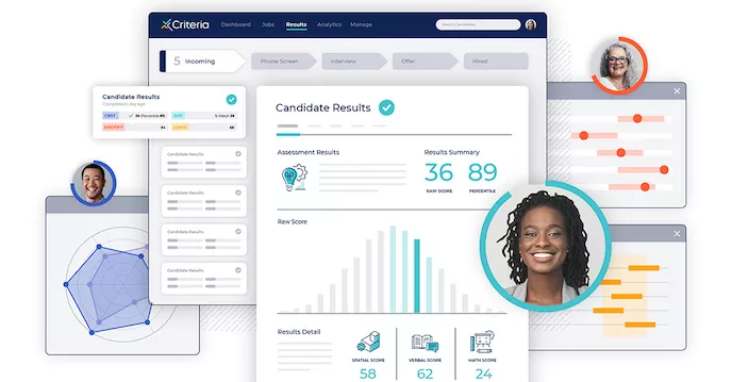
Jobvite
Jobvite is another popular recruiting CRM that provides recruiters with a variety of tools such as candidate screening through automated resume filtering and AI-driven assessments.
It helps to automate job openings on premium job boards. It also uses integration with existing HR systems.
There’s real-time reporting, and analytics tools to measure recruiting success over time for intelligent job matching for the job description.
On top of these features, it also has a multi-channel communication system that allows recruiters to interact with candidates via text message or chatbot in addition to traditional email channels.
This helps them quickly engage with applicants in order to screen out unsuitable candidates in an efficient manner.
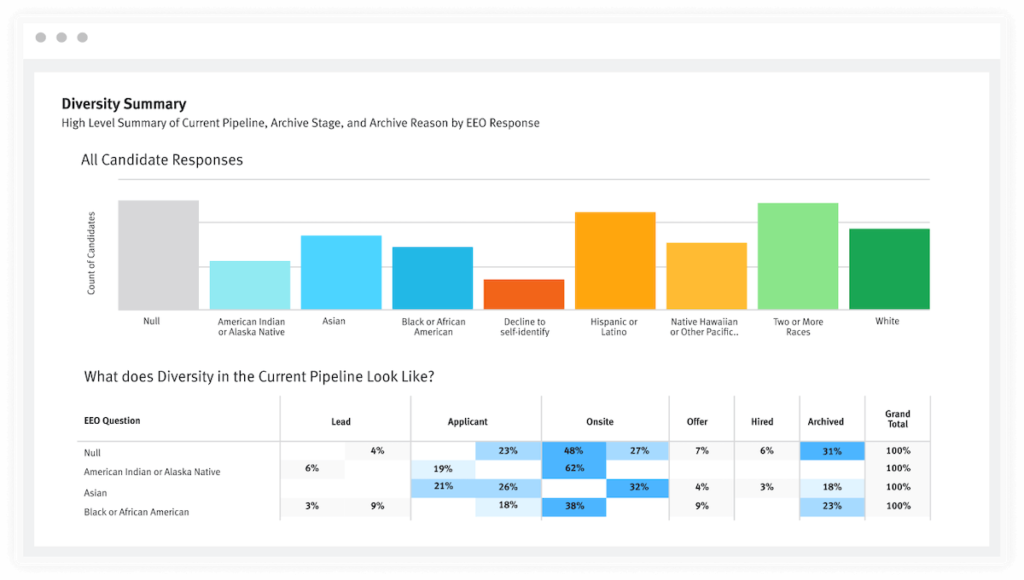
Lever
Lever is another CRM for recruitment that combines automation tools with powerful analysis capabilities enabling recruiters to easily identify top talent amongst applicants.
It offers numerous features such as customizable workflows so recruiters can adjust your hiring processes according to your preferences.
It uses AI-powered assessment tools that allow recruiters to gain insights into candidates’ skillset.
There’s also integration with existing HR systems. There’s also real-time performance tracking capabilities so they can measure how effectively they are meeting their goals over time.

Greenhouse
Greenhouse is yet another popular CRM for recruitment that provides a range of innovative features.
These include rich media job postings, candidate relationship management tools designed to nurture relationships between recruiter and applicant throughout the entire process.
It has video interview capabilities for remote interviewing sessions during COVID times.
It uses streamlined onboarding flows for new hires among many other features designed specifically for recruiting professionals looking for more efficient ways to hire quality people faster than before.
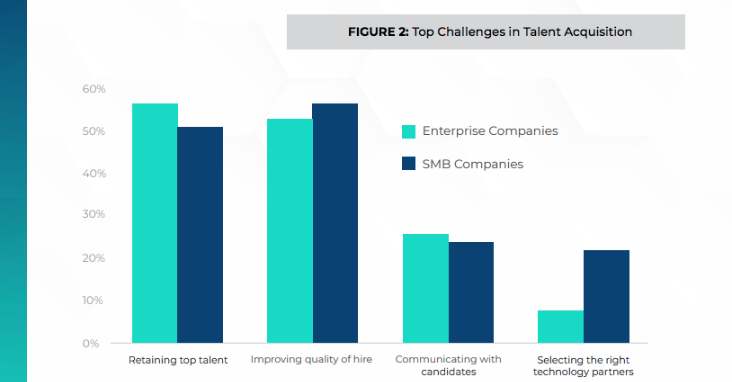
JazzHR
JazzHR is one of the most popular ATSs available today offering an array of advanced features tailored specifically towards the needs of modern-day recruiters including job posting optimization so they can target relevant candidates based on demographics or keyword searches.
It has automated tracking of applicants by sorting incoming resumes according to pre-defined criteria.
There are also customizable workflows allowing users to create custom stages within the recruitment pipeline making it easy to advance candidates through the recruiting pipeline.
Additionally, robust analytics provide valuable insights into performance metrics such as the time-to-fill rate or cost per hire among many other useful reports.
It uses integration with third-party systems like LinkedIn or Google Drive allowing users full control over your data flow without having any worries about privacy violations or data breaches.

Key features to consider when selecting a CRM for recruitment
When selecting a CRM for recruitment, there are various factors to consider. Ease of use and a user-friendly interface are some of the key features that should be taken into account.
Mobile compatibility and integrations with other HR systems can increase efficiency and effectiveness in managing the recruiting process in-house and on the go.
Cost considerations should also be taken into account when selecting a CRM for recruitment but we will discuss this in more details later in this artcicle.
Ease of use and user-friendly interface are key considerations when selecting a CRM for recruitment. User-friendliness is essential to ensure that the overall experience of using the system is pleasant and that recruiters can do your jobs quickly and efficiently.
To be truly user-friendly, the software should offer an intuitive navigation system with a clear visual overview of the recruiting process that can be customized to meet recruiters’ specific goals over time.
Candidate sourcing and resume management tools should also be considered as they provide a way to quickly parse resumes or searches for active and passive candidates in a database. These tools allow recruiters to search for relevant candidates based on demographics or keyword searches and automate the tracking of incoming resumes according to pre-defined criteria. This helps streamline the entire recruitment process and makes it easier for recruiters to identify the most qualified candidates. These tools also provide recruiters with valuable insights into applicant trends, allowing them to make informed decisions about hires.
These tools enable recruiters to quickly share updates, documents, and feedback with each other and offer a platform for peer-to-peer collaboration. This helps build stronger relationships with candidates and has the potential to increase conversion rates by keeping applicants engaged throughout the process helping to keep the candidates interested.
Collaboration and communication tools for teams are critical components of any successful CRM system because they allow recruiters to quickly share information with one another in real-time while keeping everyone up-to-date throughout the collaborative hiring process which leads to improved decision-making capabilities when it comes time to select candidates who best fit an organization’s needs. Such tools enable teams to easily share documents or comments related to specific applications while tracking feedback all in one place which reduces manual labor associated with paperwork while simultaneously increasing visibility into the progress being made throughout each stage of screening potential employees without sacrificing accuracy due to miscommunication between team members during review stages of recruitment cycles such as interviews, background checks etc.

Cost considerations for CRM for the recruitment process
Upfront costs
When choosing a CRM for recruitment, there are several upfront costs to consider. These may include license fees, implementation costs, training expenses, customization, and third-party integration fees.
Additionally, some providers also charge setup and support fees for the initial onboarding process. It is important to keep in mind that these upfront costs can vary significantly depending on the provider and the features desired by the business.
Ongoing costs and fees
After the initial setup is complete, there are usually ongoing fees associated with using a CRM for recruitment. These may include recurring monthly or annual subscription fees, maintenance fees, and/or add-on charges for additional features or updates.
Depending on the complexity of the system and the size of your company or organization, these ongoing costs can range from minimal to significant.
Return on investment
Despite the upfront and ongoing expenses associated with using a CRM for recruitment, it is still possible to achieve a positive return on investment (ROI). The software provides data insights that can be used to make informed decisions about hires and increase efficiency in managing recruiting efforts. It also offers customizable workflow and pipeline management so recruiters have more control over the process leading to higher conversion rates from qualified applicants.
In addition, automating mundane tasks such as scheduling interviews or sending bulk messages saves valuable time and resources that can be put towards other areas of HR operations instead ultimately leading to lower labor costs in the long run.

Conclusion
In conclusion, using a Customer Relationship Management (CRM) system for recruitment offers many benefits to employers and recruiters. It provides valuable insights into applicant trends so informed decisions can be made about hires with confidence. Automation of mundane tasks also helps increase efficiency and saves time and resources that can be expended elsewhere in the HR department. Finally, collaboration and communication tools enable teams to stay connected throughout the hiring process which keeps everyone on the same page while ensuring accuracy when it comes time to select the best-fit candidate for an organization’s needs. All of these features make CRM a viable option for businesses looking to streamline your recruitment processes and save money in the long run by reducing labor costs associated with the manual management of recruiting efforts.


